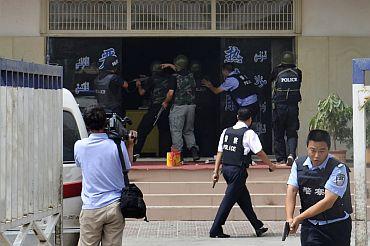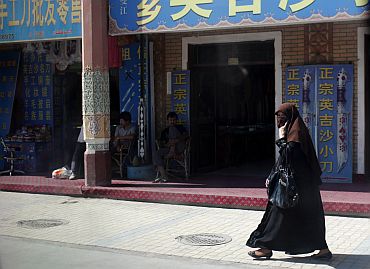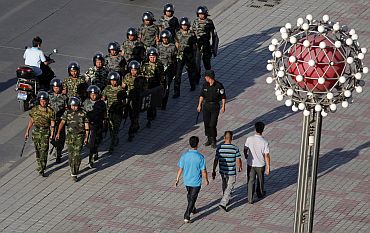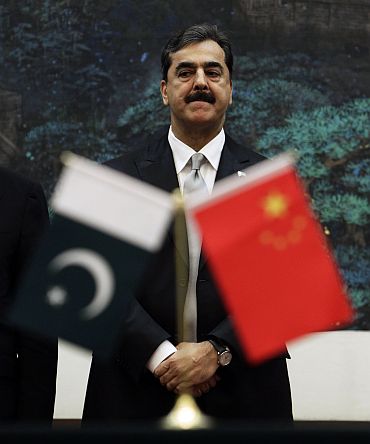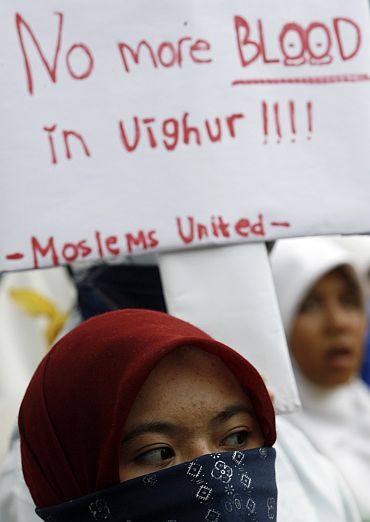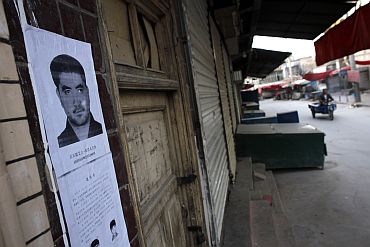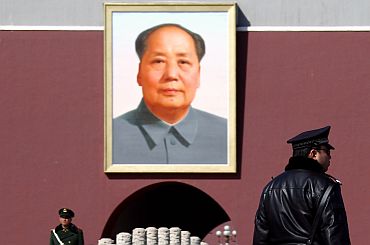 | « Back to article | Print this article |
How a 'freedom movement' severs China-Pak ties
As China accuses separatists trained in Pakistani terror camps of being behind the recent bomb blasts in Xinjiang province, Islamabad comes under mounting pressure, throwing serious question marks over its relationship with China, reports Amir Mir from Islamabad.
The much trumpeted all-weather Pakistan-China friendship has received a major setback following Beijing's August 1 allegation that the Uighur militants found involved in two consecutive bomb blasts on July 30 and July 31, in the Kashgar city of Xinjiang province, which killed 18 people, had in fact been trained in the tribal areas of Pakistan.
Chinese officials have publicly claimed for the first time that in recent years, the suspects received training in camps run by the Al Qaeda-linked East Turkestan Islamic Movement.
Though the ETIM network on the Pak-Afghan border belt has been significantly weakened in recent years in the wake of the deaths of many of its top leaders in US drone attacks, hardcore Uighur militants are still shuttling between China and Pakistan since the Xinjiang province shares a border with Pakistan.
Please click NEXT to read more...
The Pak link to Xinjiang violence irks China
Chinese authorities claimed on August 1 that the ring leader of the terrorist group which carried out the July 2011 attacks in Kashgar had learned making explosives and firearms in ETIM terrorist training camps in the tribal areas of Pakistan on the Pak-Afghan border.
The ETIM, which is run by natives of the Xinjiang province, are fighting against the settlement of Chinese Hans from he mainland and describe their struggle as part of a 'freedom movement.'
The tendency of the indigenous people fighting against settlers is not unusual in Xinjiang where over 200 civilians had lost their lives in deadly ethnic violence between the Han and Uighur communities in 2009. Although ethnic strife is nothing new in Xinjiang, it is China's accusations directed towards Pakistan that ought to merit concern.
The Chinese claim about the involvement of a terror group with training camps in Pakistan was made on the basis of an alleged confession made by captured Uighur militants.
'Terrorists, extremists and separatists in Xinjiang constitute an evil force'
Following the July violence, Zhang Chunxian, secretary of the Xinjiang regional committee of the Communist Party of China, ordered a crackdown on terrorists, religious extremists, and illegal religious activities at an emergency meeting held in the regional capital Urumqi.
The Pakistan government, for its part, was quick to promise to extend all possible cooperation and support to China against the ETIM which is also described as the Turkistani Islamic Party.
"Terrorists, extremists and separatists in Xinjiang constitute an evil force," an August 1 statement issued by Pakistan's foreign ministry had stated.
The statement came after Chinese President Hu Jintao had rung up President Asif Zardari to express concern over the growing terror activities of the ETIM in the Xinjiang province, a month before the holding of the international expo in Urumqi, the capital of Xinjiang, from September 1 to 5, 2011.
Pak under mounting pressure from Beijing
Subsequently, Lt Gen Ahmed Shuja Pasha, director-general of Pakistan's Inter Services Intelligence, rushed to Beijing to address the Chinese concerns.
According to well informed intelligence circles in the garrison town of Rawalpindi, the Pakistani military authorities are under mounting pressure from Beijing to allow the setting up of military bases in the tribal areas of Pakistan to counter the Chinese rebels operating from its soil.
In fact, the growing strength of the Pakistan-based Chinese separatist movement is a matter of serious concern for Beijing which had even asked Islamabad to allow it military presence either in the Khyber Pakhtunkhawa or in the Federally Administered Tribal Areas of Pakistan, just like the Americans, so that Beijing could effectively counter the Chinese separatists there.
Yet diplomatic circles added that the Chinese desire to have military presence in the tribal areas of Pakistan should not be painted as an attempt to set up permanent military bases there.
"China does not have any military bases outside its land unlike the United States and the prime concern of Beijing is the spread of violence from the Pakistani tribal belt to the trouble-stricken Chinese region of Xinjiang, which is the main Muslim majority province," a statement has said.
'The Chinese must be targeted both at home and abroad'
The fact that the ETIM militants had extended their network of terrorist activities to Pakistan was abundantly made clear from a 2009 threat they had conveyed to the Chinese embassy in Islamabad through a letter, expressing their intentions to kidnap Chinese diplomats and consular officers to highlight their cause.
The Chinese mission subsequently informed the Pakistani authorities that some members of the ETIM had already reached Islamabad and are planning to kidnap their staffers from the federal capital.
It transpired during subsequent investigations by the Pakistani security agencies that the anonymous threat was issued by none other than the ETIM whose members had first travelled to Jalalabad, Afghanistan, to finalise their plans.
In a subsequent video posted on an Islamist website on August 1, 2009, Abdul Haq al-Turkistani, the leader of the ETIM, urged Muslims to attack Chinese interests to punish Beijing for what he described as massacres against Uighur Muslims.
Haq said: "The Chinese must be targeted both at home and abroad. Their embassies, consulates, centres and gathering places should be targeted. Their men should be killed and captured to seek the release of our brothers who are jailed in Eastern Turkistan."
'Chinese separatists have close links with Al Qaeda'
Abdul Haq used to run a training camp for his recruits in Tora Bora in Afghanistan's Nangarhar province prior to the US invasion in October 2001.
However, he had relocated his camps to Pakistan's lawless Waziristan region. He had been operating from the South Waziristan tribal agency of Pakistan, and also accused China of committing "barbaric massacres" against Muslims in East Turkistan.
He spoke with an assault rifle to his right and what appeared to be a pistol pouch strapped to his shoulder. In June 2009, Haq was reported to have attended a high-level meeting in South Waziristan with Baitullah Mehsud, the then chief of the Tehrik-e-Taliban Pakistan, Sirajuddin Haqqani of the Haqqani militant network, and Abu Yahya al-Libi of Al Qaeda to discuss about Pakistani military operations against the TTP in the area.
Baitullah subsequently died following a missile attack by a US drone on the house of his father-in-law which he was visiting in August 2009.
Almost six months later, Abdul Haq was also killed in yet another US drone strike on February 15, 2010, in Miramshah, North Waziristan while he was traveling in a vehicle.
The Chinese separatist commander was closely linked to Al Qaeda and was the second consecutive chief of Turkisatni Islamic Party to be killed in the Pakistani tribal areas.
Abdul Haq, also known as Maimaitiming Maimaiti, became the TIP chief after the killing of Hassan Mahsum, the group's previous head, by Pakistani security forces in South Waziristan on October 2, 2004. His importance can be gauged from the fact that the US treasury department had designated him a global terrorist in April 2009, stating that he has already been appointed a member of Al Qaeda's Majlis-e-Shura or executive council, way back in 2005. Soon afterwards, the United Nations Security Council had too designated him a terrorist leader.
'All ethnic groups in China are treated equally'
In fact, the Turkistani Islamic Party or the East Turkistan Islamic Movement pleads the creation of an independent Islamic state of East Turkistan in the Muslim-dominated Xinjiang province of China.
East Turkistan had maintained a measure of independence until the early 1950s, when Mao's victorious rebel armies turned to the peripheries and began securing Chinese borders, capturing Manchuria, Mongolia, Tibet and East Turkistan.
The native Uighur resisted the Chinese occupation until 1960s, but failed to win support from neighbouring Muslim states because of their fractured tribal nature.
Since the mid-1980s, however, an active pan-Islamic movement has been trying to cement the opposing groups together against the alleged 'Chinese occupation of their homeland', pressing for an independent East Turkistan state.
Yet Beijing, which views Xingjian as an invaluable asset due to its crucial strategic location near Central Asia and its large oil and gas reserves, has been using all possible means to quell the separatist movement.
On the other hand, however, Beijing blames the Uighur separatists for carrying out bombings and shootouts in the Xinjiang province, causing an atmosphere of insecurity and fear in China.
The Chinese government defends its treatment of minorities, saying all ethnic groups in the country are treated equally and that tens of billions of dollars in investment and aid have dramatically raised living standards.
